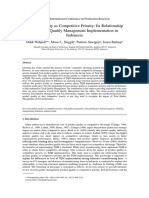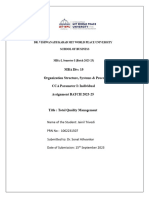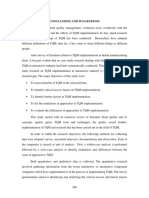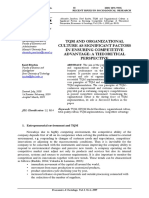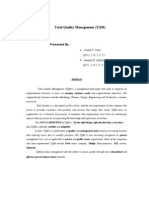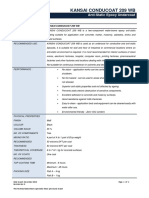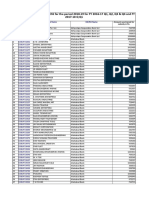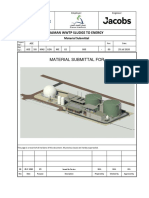The limitations that prevent Total Quality Management
(TQM) from developing strongly in the food processing
industries in Vietnam.
Phạm Thùy Anh
SEM, HUST
1, Introduction
Total Quality Management (TQM) is an organizational management process that aims to
enhance satisfaction and organizational performance by focusing on continuous improvement
and the total involvement of all employees, with an aim of realizing long-term goals and
objectives. Globally, TQM has been identified as a critical factor that helps organizations
improve productivity, product quality, and competitiveness across various sectors. In the food
processing sector, the application of TQM is especially vital as it directly affects the quality
of food produced, the efficiency of food production, and consumer confidence.
The food processing industry in Vietnam is one of the leading industries supporting the
country’s economy and plays a vital role in meeting internal demand as well as contributing
to exports in the external market. Despite its importance, this sector faces numerous
challenges in implementing TQM effectively. Some of these challenges include structural
limitations, technological constraints, poor understanding and perception of quality
management principles, and cultural factors that hinder the growth and adoption of TQM
practices within Vietnam’s food processing industry.
This research aims to explore the limitations that hinder the strong adoption and integration
of TQM within Vietnam’s food processing sector. By identifying and analyzing these
barriers, the study seeks to offer practical recommendations to overcome these challenges,
thereby supporting the industry in improving product quality, ensuring food safety, and
enhancing its global competitiveness.
2, Review of Previous Studies
Several studies have been conducted globally and regionally to explore the factors affecting
the implementation of TQM across different industries. For instance, a study by Powell
(1995) emphasized the critical role of organizational culture in the successful implementation
of TQM, arguing that firms with adaptive and quality-focused cultures are more likely to
succeed in adopting TQM principles. Similarly, Kaynak (2003) highlighted the positive
relationship between TQM practices and organizational performance, particularly in sectors
where quality directly impacts consumer satisfaction, such as food processing.
In the Southeast Asian context, studies have revealed that cultural and infrastructural factors
significantly influence TQM adoption. A study by Prajogo and Sohal (2006) in Malaysia’s
manufacturing sector demonstrated that employee involvement and leadership commitment
are critical for TQM success. Meanwhile, research by Nguyen et al. (2018) in Vietnam’s
textile industry identified a lack of awareness and resistance to change as major barriers to
TQM implementation.
�Specifically in the food processing sector, several global studies have emphasized the
importance of TQM in ensuring food safety and meeting international standards. For
example, a study by Mensah and Julien (2011) showed that TQM practices in food
processing significantly reduce risks associated with food contamination and enhance
customer trust. However, these studies also highlight challenges such as inadequate training,
technological gaps, and limited regulatory support, which resonate with the challenges faced
in Vietnam’s context.
While these studies provide valuable insights, there remains a lack of comprehensive research
focused on the unique challenges and opportunities for TQM implementation in Vietnam’s
food processing sector. This research aims to fill this gap by analyzing the specific barriers in
Vietnam and proposing tailored solutions to address them.
Research Questions
To achieve the objectives of this study, the following research questions will be addressed:
1. What are the primary limitations hindering the adoption and integration of TQM in
Vietnam’s food processing sector?
2. How do structural, technological, cultural, and perception-based challenges affect the
implementation of TQM in this industry?
3. What strategies can be proposed to overcome these barriers and promote the effective
adoption of TQM within Vietnam’s food processing industry?
By answering these questions, the study aims to provide actionable insights that will
contribute to the advancement of TQM practices in Vietnam’s food processing sector,
ultimately supporting the industry in achieving higher quality standards and enhanced global
competitiveness.
3, Methods and methodology
4, Findings and discussion
5, Conclusion
6, Reference
1. Powell, T. C. (1995)
"Total Quality Management as Competitive Advantage: A Review and Empirical
Study." Strategic Management Journal, 16(1), 15-37.
DOI: 10.1002/smj.4250160105
2. Kaynak, H. (2003)
"The Relationship Between Total Quality Management Practices and Their Effects on
Firm Performance." Journal of Operations Management, 21(4), 405-435.
DOI: 10.1016/S0272-6963(03)00004-4
3. Prajogo, D. I., & Sohal, A. S. (2006)
"The Integration of TQM and Technology/R&D Management in Determining Quality
and Innovation Performance." Omega, 34(3), 296-312.
DOI: 10.1016/j.omega.2004.11.004
4. Nguyen, T. T., Pham, T. K., & Le, M. T. (2018)
"Barriers to TQM Implementation in Vietnam\u2019s Textile Industry: A Case
Study." Asian Journal of Business and Management, 6(2), 15-27.
5. Mensah, L. D., & Julien, D. (2011)
"Implementation of Food Safety Management Systems in the UK." Food Control,
� 22(8), 1216-1225.
DOI: 10.1016/j.foodcont.2011.01.019
6. Deming, W. E. (1986)
Out of the Crisis. MIT Press.
This foundational book provides essential insights into the principles of TQM and
continuous improvement, focusing on quality and productivity.
7. Juran, J. M. (1988)
Juran on Planning for Quality. Free Press.
Juran's work outlines systematic approaches to quality planning and emphasizes the
importance of management involvement in achieving organizational quality.
8. Oakland, J. S. (2011)
Total Quality Management and Operational Excellence: Text with Cases. Routledge.
This text provides a comprehensive overview of TQM principles, tools, and case
studies, including applications in manufacturing and food sectors.
9. Ahire, S. L., Golhar, D. Y., & Waller, M. A. (1996)
"Development and Validation of TQM Implementation Constructs." Decision
Sciences, 27(1), 23-56.
DOI: 10.1111/j.1540-5915.1996.tb00842.x
10. Talib, F., Rahman, Z., & Qureshi, M. N. (2011)
"A Study of Total Quality Management and Supply Chain Management Practices."
International Journal of Productivity and Performance Management, 60(3), 268-288.
DOI: 10.1108/17410401111111998
11. Zhang, Z., Waszink, A. B., & Wijngaard, J. (2000)
"An Instrument for Measuring TQM Implementation for Chinese Manufacturing
Companies." International Journal of Quality & Reliability Management, 17(7), 730-
755.
DOI: 10.1108/02656710010315247
12. Arumugam, V., Ooi, K. B., & Fong, T. C. (2008)
"TQM Practices and Quality Performance: The Mediating Role of Innovation."
International Journal of Quality & Reliability Management, 25(8), 814-835.
DOI: 10.1108/02656710810898635
13. Pham, T. H., & Phan, T. A. (2020)
"Exploring the Barriers to TQM Implementation in Vietnam's Food Processing
Industry." Vietnam Journal of Business Research, 8(2), 45-62.
